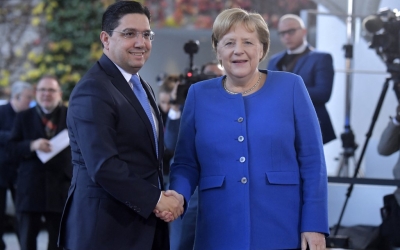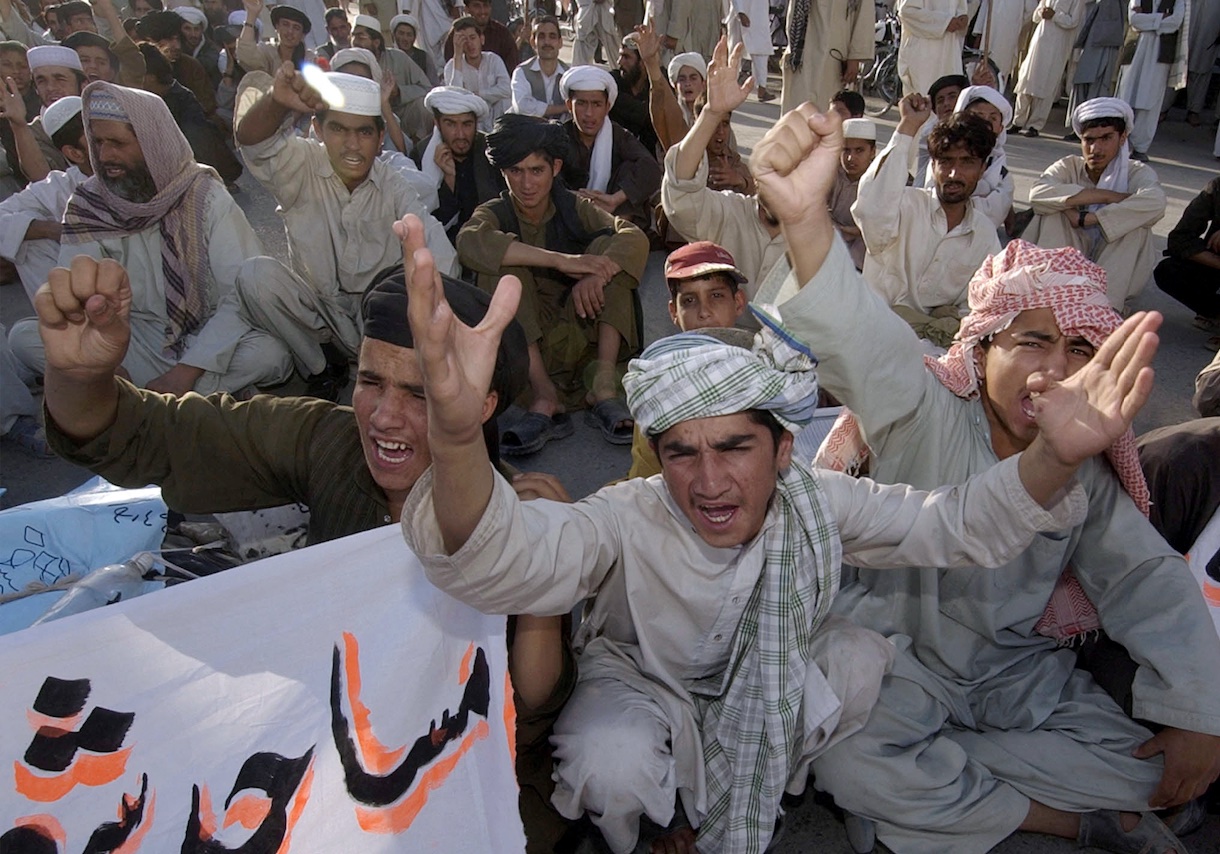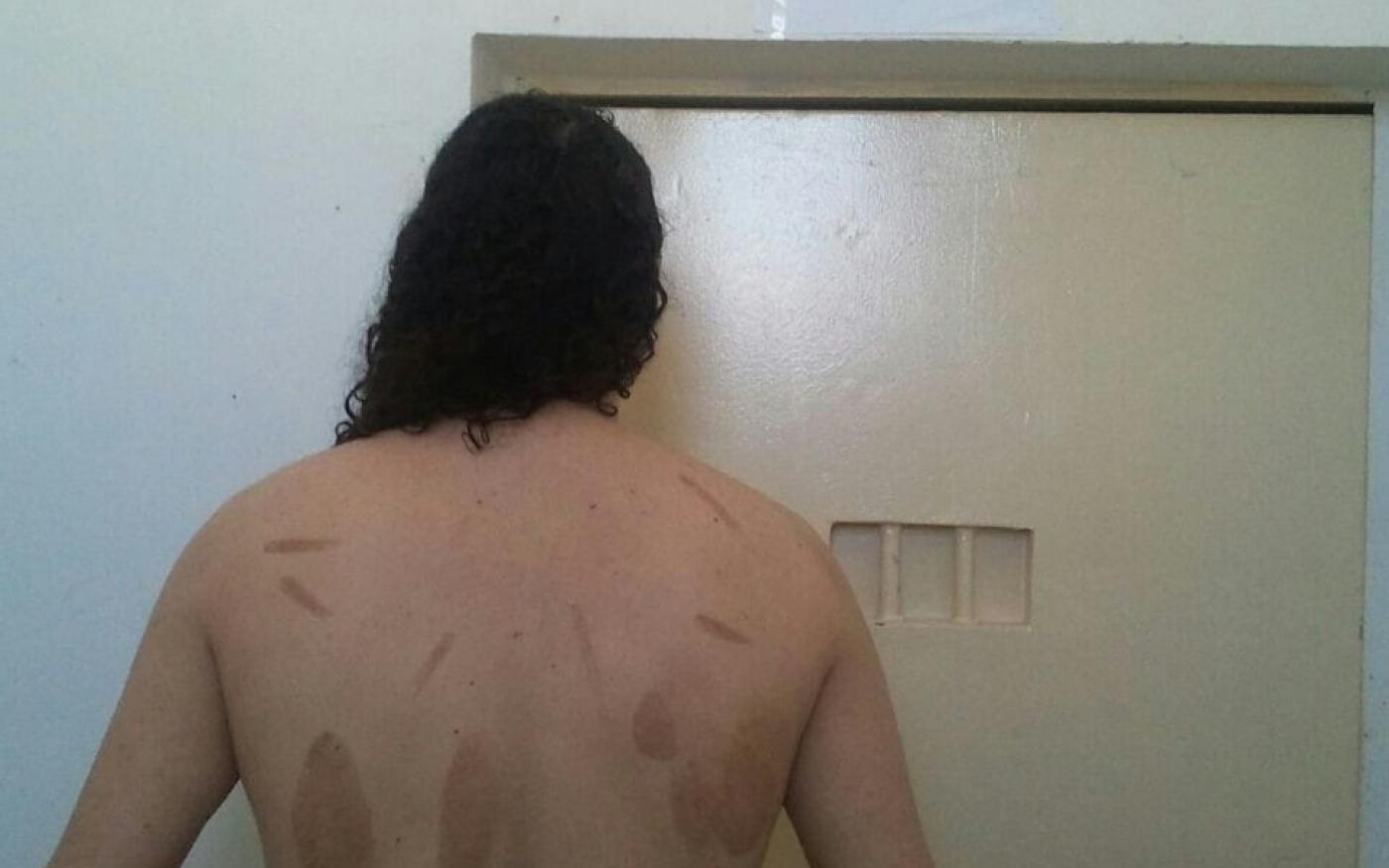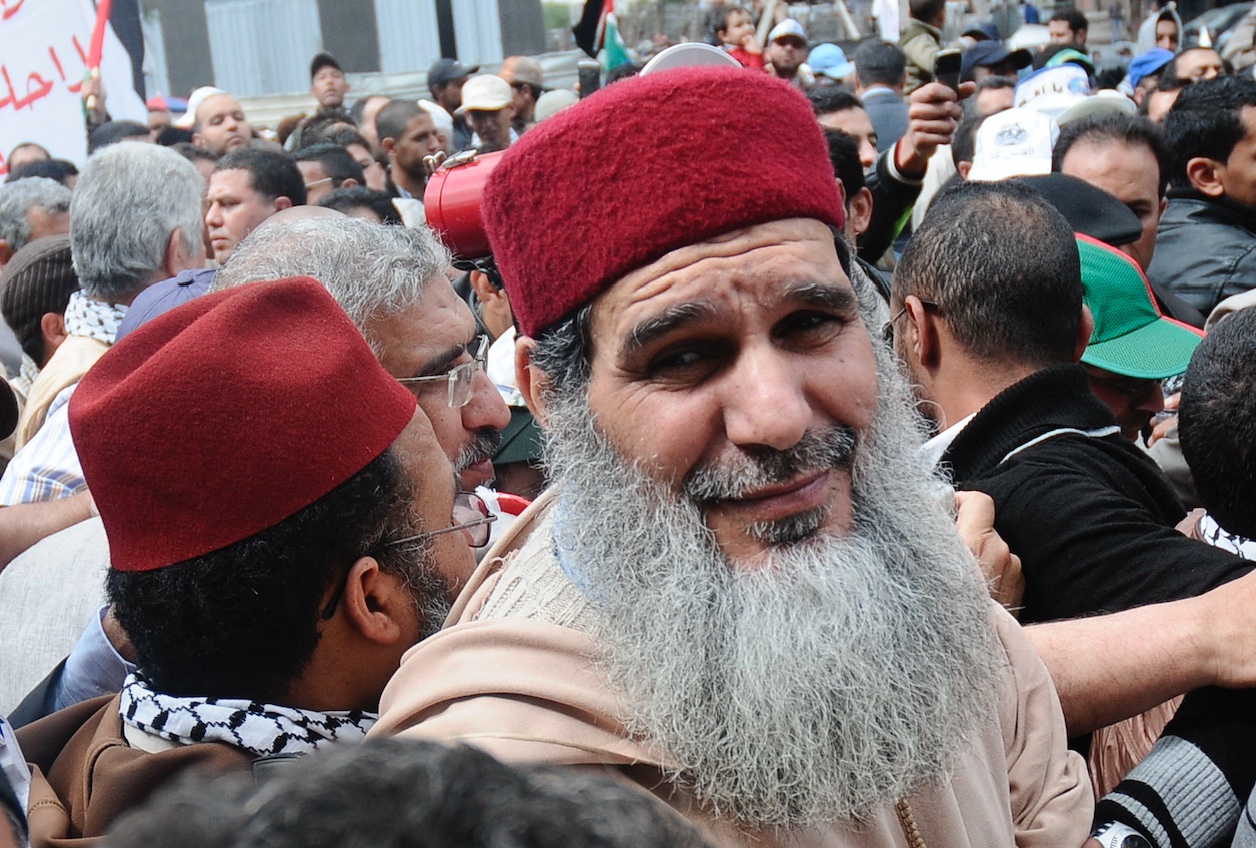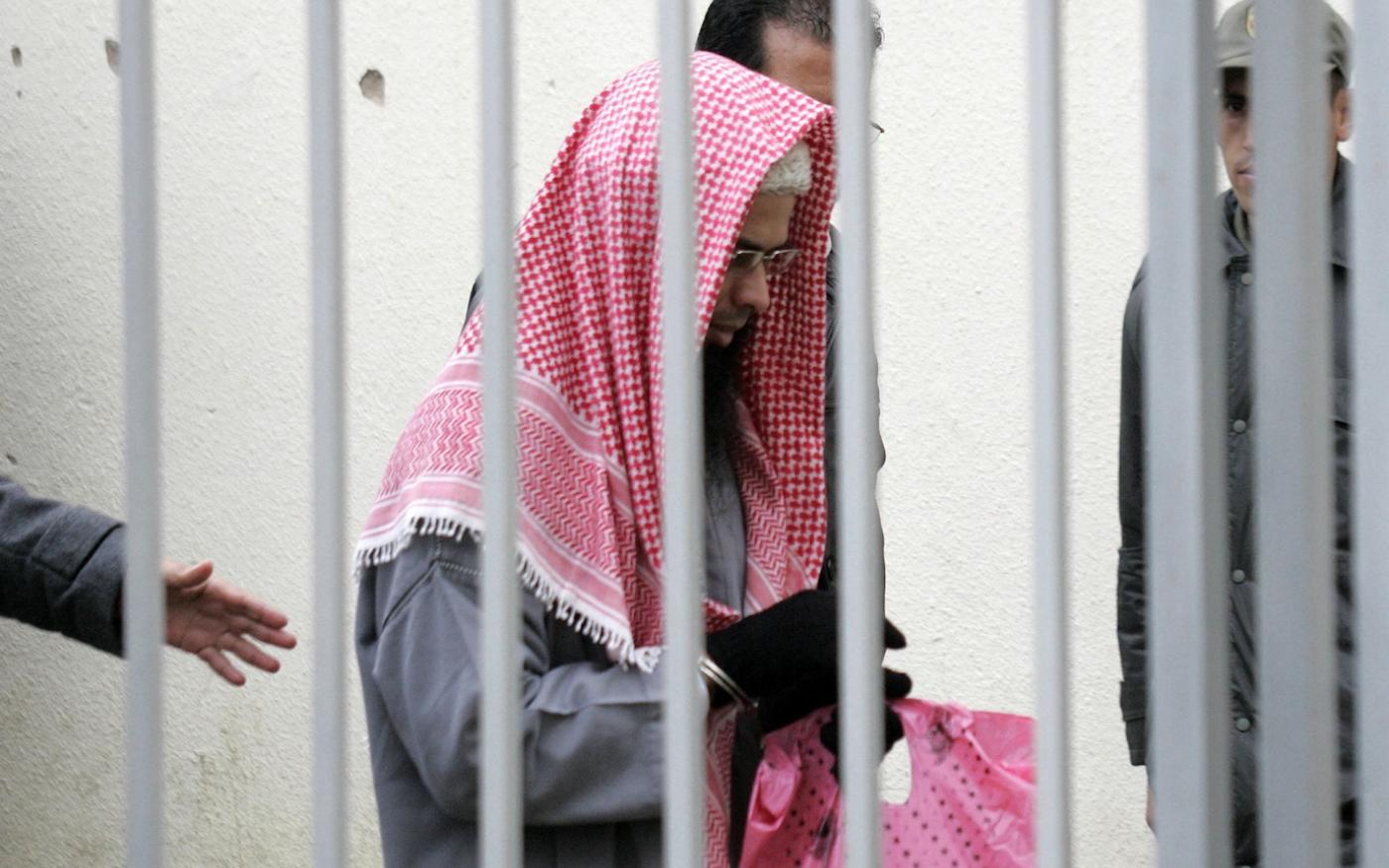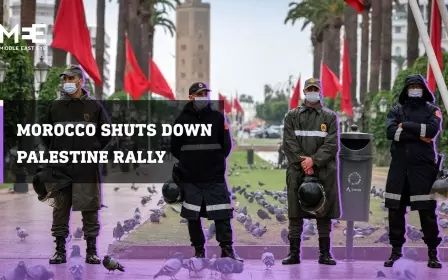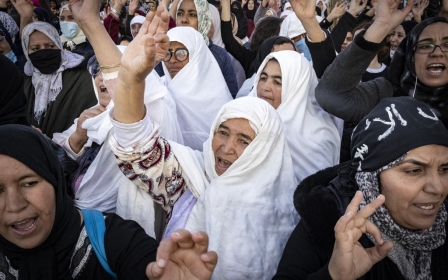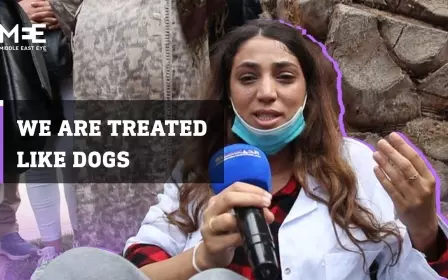Mohamed Hajib: An investigation into the Moroccan secret service's public enemy No 1
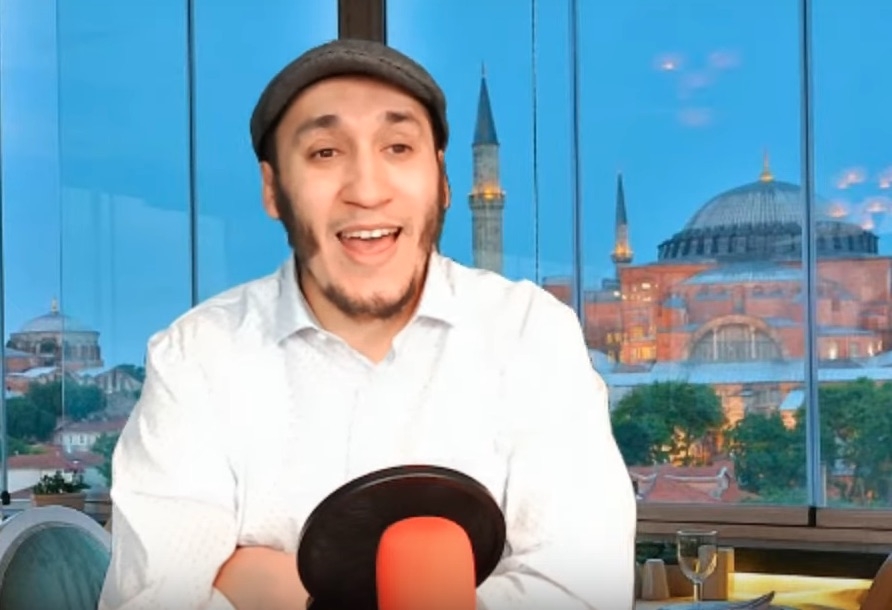
"As-salam alaykoum. Who is this? Is that Mohamed Hajib? The former political prisoner?"
A long silence, a roar of laughter and an answer ventured in hesitant French: "Former political prisoner Mohamed Hajib speaking!"
This is not quite what you would expect from the man most wanted by the two main political police forces in Morocco, the Moroccan Directorate General Directorate for National Security (DST), which has added the letter G for General into its acronym, to distance itself from its previous shady operations, and the Moroccan Directorate General of Studies and Documentation (DGED), a purportedly counter-espionage department that remains, nevertheless, a security apparatus that controls a part of the Moroccan press and, more significantly, the kingdom's diplomacy.
It is in part due to Hajib, who asks to be referred to as a "former political prisoner" rather than an "Islamist," and whose self-proclaimed mission is to "defend all human rights and not just those of detained Islamists". It is an issue that has spurred the Moroccan government, at the behest of the foreign minister, to suspend all contact with the German Embassy in Rabat, as well as with all German institutions located within the kingdom.
Described as a very "dangerous Islamist terrorist" who calls on Moroccans to rise up and shed blood, vilified day and night in the Moroccan media, accused and publicly denounced by several prominent people and derided on screen, most recently by Omar El-Kzabri, imam of the Hassan II Mosque in Casablanca, there's no doubt that Hajib, alongside journalists and human rights activists, is in the crosshairs of the Moroccan secret services.
Out of the reach of the Moroccan authorities, he has a high profile on social media, mainly on Facebook and YouTube, where his many livestreams, blending facts and sarcasm with a dash of humour, are viewed by tens of thousands of subscribers.
Before Middle East Eye's meeting with Hajib, we spent a month scrutinising dozens of videos and reading a variety of sources including legal, police, diplomatic and UN documents, in several languages: Arabic, German, French and English. This investigation is the outcome of that work.
From Tetouan to Pakistan
Mohamed Hajib lives in Duisburg, in the western German state of North Rhine-Westphalia, a city at the confluence of the Rhine and the Ruhr rivers, near Dusseldorf.
His photo shows a smiling young man with a peaked cap pulled down on his head, prominent sideburns and a little goatee.
He was born in Tetouan, in northern Morocco, on 23 May 1981, the son of an Arab teacher originally from Tiflet and a mother who worked as a court official in that northern town. Ideologically, he followed a different path to his father, who was once imprisoned for his Marxist affiliations.
In December 2000, he emigrated to Germany, where in 2008 he was granted citizenship. Was it the distance from his homeland that compelled him to become an adherent of the Tablighi Islamic movement, in that way some Muslims are drawn more powerfully to their faith the more they are cut off from their roots? Perhaps.
Tablighi Jamaat is, according to some, a fundamentalist "sect" of Islam, while to others it is a "worthy" missionary movement. Tablighi are certainly strict, but they have never been involved in armed Islamist operations and their religious traditionalism attracts more pacifist, and more importantly apolitical, types.
To become a good Tablighi preacher, there are three main centres worldwide, all located in the Indian subcontinent, where this movement was born in 1927: India, Bangladesh and Pakistan
To become a good Tablighi preacher there are three main centres worldwide, all located in the Indian subcontinent, where this movement was born in 1927: India, Bangladesh and Pakistan. In these three countries, the Tablighi centres are street-front and not shrouded in any secrecy.
Hajib chose Pakistan, and at the end of June 2009 he flew to Istanbul, then taking another flight to Mashhad, in Iran, where he met up with a small community from his movement before making the onward journey to Pakistan.
In stark contrast to Iran, where he received his visa on arrival at Mashhad airport, entering Pakistan was a quite different story. The border is a colander, a chaotic place where he was required to pay $50 to a Jamaat al-Tabligh emir to accompany him and take care of the visas. In fact, it was a bribe needed to facilitate an unproblematic passage through the border checkpoint.
Hajib wanted to travel to Lahore, where an international forum was scheduled for November of that year. A document from the state of North Rhine-Westphalia, dated 22 February 2010, affirms that the LKA, the regional police, were aware of the trip and the religious conference.
No mention is made of the young man having any terrorist leanings. On the contrary, he was classified, like all Tablighi at the time, as a "radical Islamist". This was in fact the definition of Tablighism that prevailed in Germany up until the Leipzig Supreme Administrative Court clarified the matter in its historic ruling on 25 October 2011, wherein it explicitly states that "the objectives and activities of Jamaat al-Tabligh did not support terrorist activities".
After several pilgrimages to Pakistan, meeting with communities and religious centres, the young man decided to return to Germany, following the same route as he had taken.
It was not to be. He was stopped on 1 October 2009 during a routine check by the Pakistani army while travelling on a bus heading for Panjgur. Remember that place name; it will play an essential role in Hajib's subsequent odyssey.
Panjgur is less than 100km from the Iranian border and 641km from Chaman, a border town with Afghanistan. Unless you can fly, the only route to access Afghanistan from Panjgur is through Quetta, which is 130km to the south of Chaman.
The specifics of its location are important insofar as Hajib was later accused by the Moroccans of having been stopped "at the Afghan border," not the Iranian one.
He was then passed to the Pakistani secret services, who remanded him in prison in Quetta. But why in Quetta, which is two hours and 40 minutes by car from the Afghan border, and not elsewhere? Panjgur is 1,500km from Islamabad, and you cannot get to the capital of Pakistan without passing through Quetta.
Moreover, the prison in that city is known as a sorting hub through which passes an endless stream of detainees, students of madrasas, and Turkish traders, of which there are very many in the region, as well as foreign Tablighi, who are generally either released or transferred to other detention centres. The Salafists, however, are sent to "special centres," which are often visited by the Americans.
'Back then, I didn't know my rights'
Hajib was left there to languish for a month before being transferred to Islamabad, where he was investigated for exactly three months and 27 days, between 1 October 2009 and 17 February 2010. Finding themselves with nothing they could charge him with, other than illegally entering Pakistan, the authorities decided to expel him.
No charges were ever brought against him. This is not just according to Hajib but also worded in an email following his arrest in Morocco, dated 8 August 2011, sent to the German foreign minister in Berlin by the Islamabad consul, in which it is stated that "no accusation of any crime has ever been brought against him".
However, as suspicion of Muslim Arabs in Pakistan is high, particularly after 9/11, the German consulate in Islamabad notified Berlin of Hajib's expulsion.
And so it was that, when he landed at Frankfurt airport on 17 February 2010 at 1.47pm, on a flight run by a Pakistani airline, he was arrested immediately on disembarking the plane by a squad of "25 German policemen," some of whom were heavily armed.
Under constant guard, he was interrogated for an hour by police officers of the German Federal Criminal Police Office (BKA), who prohibited him from leaving the international zone of the airport. At 10.30pm, he was propelled onto Lufthansa flight LH4116, departing for Casablanca.
Why did he not protest that he had German nationality?
"That's easy to say now, but back then I didn't know my rights," he explained. And little did he know what awaited him in his country of origin.
In the early hours of 18 February, his plane landed at Casablanca's Mohamed V airport. "Five DST agents," he states, awaited him on the boarding ramp. He was unceremoniously removed and taken to an office and blindfolded.
Handcuffed and shackled, he was then taken to the Maarif district of Morocco's financial capital, to the head office of the Morocco's National Brigade of Judicial Police (BNPJ). During the car journey both blows and insults were thrown. "Terrorist," "criminal," "You're here to bomb Morocco," "What the hell were you doing in Pakistan?"
But on 1 March, to break his resistance, his torturers threatened to bring his wife and his mother and rape them in front of him
At the BNPJ, led then by Abdelhak Khiam, future head of the Moroccan anti-terrorism unit, he was thrown into a miniscule cell. He was insulted, hung by his arms and beaten on the face and feet.
His gaolers told him to admit it. "Admit what? That I'm a Tablighi? Yes I am. But I'm not a terrorist," he tried to respond. In vain.
For 12 days, he was subjected to daily torture sessions, according to information transmitted subsequently to the Alkarama foundation, an organisation that "combats injustice in the Arab world" and has offices in Geneva.
Hajib remained optimistic, believing his torturers would realise he hadn't done anything and set him free.
But on 1 March, to break his resistance, his torturers threatened to bring his wife and his mother and rape them in front of him. "Then, I cracked and signed a confession that they didn't even let me read."
Sentenced to 10 years in prison
Brought before Sale anti-terrorism court that same day, he learned from the investigating judge, Abdelkader Chentouf, that he had signed "full confessions" on a report dated 19 February, though in fact they had only just been signed.
He disputed this version, trying to explain to the judge that he had been tortured, that he had signed under duress, and that his signature was dated 1 March not 19 February.
Nothing happened. Judge Chentouf, in his customary manner, did not even question why a suspect who signed confessions on 19 February was before him 11 days later. He did not order any enquiry, not even into the dating of the confession or the torture allegations.
At almost exactly the same time, in another court, a deputy of the attorney general at the Court of Appeal of Rabat, Abdelaziz Raji, informed Hajib's mother that the German state had just revoked her son's German nationality.
For Hajib, this episode is key. "This shows the complicity between the German and the Moroccan secret services. How could this deputy have known that these proceedings had just been brought by the German federal interior minister?" he asks.
'Moroccan justice is a factory for arbitrary rulings'
- Mohamed Hajib
Proceedings that, he adds from Duisburg, were abandoned by the German state in the absence of any proof ascribing any "terrorist" tendencies or linking him with any such operations.
After being brought before Judge Chentouf, he was moved to unit 1 of Sale prison, known as "Zaki". As a welcome, he was beaten again - this time, though, by the prison staff and for no reason. "Perhaps it's a tradition to beat newcomers," he ponders mischievously.
On 24 June 2010, Hajib was sentenced to 10 years in prison for "forming an illegal group," "financing terrorism" and having wanted to go to Afghanistan.
It was an expedited trial, as indicated by the hastening of German diplomats to the courtroom. An internal note that Middle East Eye has seen, dated 27 June 2010, reads as follows: "No witnesses were summoned to appear at this hearing. And no evidence was presented. The presiding judge based the sentence solely on the investigation report."
"How can it be," Hajib continues, "that someone leaves Pakistan with a German passport and is arrested on the Iranian, not Afghan border, without ever being investigated for terrorism by the Pakistani authorities and with virtually no link to his country of origin other than an extended family, is sentenced in Morocco for 'forming a criminal group' and 'financing terrorism'? It makes no sense! Moroccan justice is a factory producing arbitrary rulings."
In the same note mentioned above, the German ambassador also indicates that during the hearing "the accused's declarations were almost imperceptible due to his poor state of health". Hajib at that time was on the 46th day of a hunger strike in protest at his situation.
From his first conviction and for the seven years that followed, his life fell into a rhythm of transfers from one prison to another and the mistreatment he was forced to endure.
From Unit 1 of Sale, he was sent to Toulal 2, a prison in Meknes, brought back to Sale and housed in Unit 2, then sent to Tiflet 1, where he endured horrific torture, this latter time as attested to by several photos he managed to have smuggled out of the prison.
His torturers used objects that left burn marks on his back. Finally he ended up in Tiflet 2, the only place, he says, where he was not subject to brutality.
In the meantime, Hajib was one of the faces of the prison protest that shook Sale central penitentiary for two days, on 16 and 17 May 2011, in demonstration against arbitrary detentions and endless beatings.
He can be seen in the pictures and videos that circulated on social media, his head wrapped in a turban, protesting vocally.
This action earned him many more beatings, this time in front of Abdelhafid Benhachem, the prison governor at that time. Benhachem was a seasoned veteran of repression in Morocco, who would subsequently, in 2015, be tried for the crime of genocide by Spanish judge Pablo Ruz at the Madrid National Court: not for the mistreatment inflicted on Moroccan detainees, but rather for crimes committed against the Sahrawis during his time as governor of Smara between 1976 and 1978.
On the telephone, Hajib says that he knew Benhachem well, having negotiated with him for the end of the prison riot. "He was right there in front of me while I was beaten, accompanied by two men in suits and ties, DST agents."
Hajib claims 1.5m euros compensation
This is why the verbal note of the German ambassador to Rabat, dated 30 June 2011, of which MEE has had sight, is worded somewhat differently to the usual diplomatic terminology applicable to Moroccan foreign affairs. I
t stated that Hajib "had suffered not insignificant injuries" and that "he had been subjected [...] according to his own testimony, on several occasions to abuse and bodily violence inflicted on him in the prisons of Sale and Meknes [Toulal is in Meknes], where he had been transferred for a short time. He claims to have suffered, among other abuses, beatings and threats and to have attempted suicide."
It also motivated the embassy to express its "concern" and to request that the "safety and bodily integrity of Mr Hajib and other [supposed] German detainees be guaranteed in the future".
This intervention seems to have had some effect because his sentence of 10 years, which had been confirmed in a court of appeal, was quashed by the Court of Cassation then reduced to five years following a further judgement by this same Court of Appeal on 9 January 2012.
For his part in the prison uprising, he received two more years on his sentence. The opinion of the UN working group on arbitrary detention, given on 31 August 2012, requesting his immediate release on grounds of the identified breach by Moroccan justice of several international conventions, proved ineffective. He remained in prison.
'Have you heard of any other cases of dangerous Islamists convicted of financing terrorism whom the Moroccan courts have sentenced to just five years of prison?'
- Mohamed Hajib
Today, Hajib says with amused disdain: "Have you heard of any other cases of dangerous Islamists convicted of financing terrorism whom the Moroccan courts have sentenced to just five years of prison? These five years serve their purposes to justify my presence in prison and the ill-treatment I suffered."
When released on 18 February 2017, he stayed in Morocco for three days to see his parents, and then took the first flight to Germany. For him, seven years of prison was seven years too many. And he has no intention of forgiving the ordeal, the marks of which he still bears on his body. With the help of his German lawyer, he requested an expert medical examination.
The medical examiner's report, done in Dusseldorf and dated 2017, is damning. Based on the statements of a psychiatrist, a dermatologist and other specialists who assessed the Moroccan-German citizen, there was no room for doubt: Mohamed Hajib suffered torture during his detention in Morocco.
The German state granted him an income and several years later awarded him a 50 percent disability allowance.
Deciding to take things further, he took his case to the German courts, where he is asking for 1.5 million euros ($1.8m) in compensation on grounds that they expelled a German citizen and delivered them into the hands of Moroccan torturers. The matter is still with the courts.
In 2018, at the same time, with the help of the Alkarama foundation, his case came before the United Nations Committee Against Torture, the final outcome of which Moroccan diplomacy must await anxiously, he notes with undisguised amusement.
At the end of 2019, Hajib reactivated his social media accounts on Facebook and YouTube and started to talk about his mistreatment and denounce the human rights situation in Morocco.
In his livestreams, he never mentions King Mohammed VI by his title, but instead refers to the "French resident-general," a senior civil servant sent by the French republic to run Morocco in colonial times.
The head of the DST and essentially of the Moroccan police in its entirety, Abdellatif Hammouchi, is referred to as the "Hammouchi Show". No big deal perhaps, but his livestreams are starting to become very popular in Morocco and are attracting the attention of the police authorities, particularly when he announced legal action against those responsible for his incarceration and physical torture.
Having maintained their silence in respect of his case since 2017, the police authorities took swift action when in several videos, specifically those on 3 May and 13 June 2020, Hajib called on Moroccans to take to the streets in defence of their rights.
This set the wheels of the deep state turning. Videos with crude montages, cut with incendiary declarations by Ayman al-Zawahiri, the head of al-Qaeda, show Hajib in the process of asking Moroccans to take to the streets for "bloodshed" despite the fact that this term is never used by Hajib who, on the contrary, insists on peaceful protests.
Hajib's words in these two videos boil down to the following: "The Moroccan regime breaches your rights," "you can't take any more of this criminal regime," "don't let this situation drive you to commit suicide; it's better to protest in the streets to reclaim your rights and let these criminals shoot you. You will die as a martyr, but you will have gained something for your children," and "we have to bring this regime to an end".
All the appearances of political affair
These days Habib explains these calls for rebellion by the great anger he feels when he sees on social media young people killing themselves because of food shortages and the coronavirus. "I have never called for suicide missions or bloodshed, everyone knows that. I have called for resistance against a dictatorial regime. I haven't said 'kill!' I have said 'Don't kill yourself, let the criminals kill you'."
This is a nuance understood by the prosecution service in Duisburg, which opened a file after receiving a direct complaint from the DST, on 10 July 2020. A complaint was refiled on 17 July with a video dated 14 July.
In its resolution dated 11 August, the German public prosecutor rejected the Moroccan complaint on the following grounds: "There is no crime. In his declarations [...], M. Hajib calls for resistance against the Moroccan government. [...] No criminal offence has been committed." To be clear, states the Duisburg legal prosecution, Mohamed Hajib exercised his right to freedom of speech.
This slap in the face dealt not only to the Moroccan police authorities but also to the magistrature of the Kingdom of Morocco should have been left there. For several reasons too. Hajib is under close surveillance by the German secret services, who watch every single video, translating and reading all his posts published on Facebook.
'The declarations of Mohamed Hajib, which can be read on Facebook, are expressions of political opinion without any discernible Islamic reference'
- Ekkehard Rudolph, German specialist in Islam
It seems hard to believe that the powerful Germany intelligence agency would have let anything slip by them about this man, particularly considering the serious dispute it brought before its own courts to expel him in 2010.
A further reason which surely influenced German prosecutors is neither of the social media platforms through which Hajib broadcasts, Facebook and YouTube, saw fit to take them down, presumably judging that their content didn't breach their rules.
MEE learned during its investigations that according to the complaint filed with the DST, the legal authorities of North Rhine-Westphalia asked Ekkehard Rudolph, an Orientalist and specialist in Islam, to evaluate Hajib's Facebook profile.
His response on 28 July 2020, of which MEE has also had sight, is conclusive. "We have examined the facts [...] in detail and we have arrived at the following conclusion: the declarations of Mohamed Hajib, which can be read on Facebook, are expressions of political opinion without any discernible Islamic reference. They therefore have no potential to be assessed in any meaningful way from the Islamic studies perspective," writes Rudolph.
But the Moroccans had no intention of giving up the chase. In the middle of August, amid one of the worst pandemics in history, Abdelaziz Raji, the very same man who in 2010 told Hajib's mother that Germany had withdrawn his nationality, came back on the scene with an international arrest warrant issued on 13 August, two days after the German refusal to pursue Hajib.
This was transmitted to the Interpol national bureau in Morocco, which is headed up by a certain Mohamed Dkhissi, who is none other than the current director of the famous National Brigade for the Judicial Police (the same department Hajib accuses of torturing him for two weeks in 2010), placing the Moroccan-German citizen on the red-notice list.
This dubious strategy lasted a few months before Interpol's general secretariat in Lyons decided to revoke this notice and to remove the name Mohamed Hajib from its database entirely.
In its conclusions, Interpol considered the Hajib case was rooted in political persecution rather than criminal prosecution. The decision was notified to all parties on 5 February 2021. For Morocco, its justice system and its police force, this was not just humiliating, it was a sledgehammer blow.
It is from this moment onwards that the Hajib case takes on the appearance of a political affair. The campaign against him intensified in the press and on social media. Germany, its justice system and its police force came under attack, accused of not wanting to arrest "the Islamic troublemaker".
Bizarrely, Interpol and the social media platforms he uses for his livestreams, Facebook and YouTube, were spared.
Accusations from former Islamic leaders
What's more, appeals were made to former Salafist leaders, such as Mohamed Fizazi, Hassan Khattab and other lesser figures, to join their voices to the chorus of accusations naming Hajib as a dangerous "terrorist".
Were it not for the trademark conceit of political policing, accentuated this time by angry impotence, the call to these discredited former leading lights of Salafism would have set some teeth on edge within the Moroccan security services.
Mohamed Fizazi is a radical Salafist who has in the past applauded the assassination of the Egyptian intellectual Faraj Fouda in 1992. Sentenced to 30 years in prison for his part in the 2003 terrorist attacks in Casablanca (the Moroccan justice system concluded that the 12 suicide bombers who killed 33 people were emulating him), he was released in 2011.
This was stand-out generosity in a country where sentences handed down for "Islamic terrorism" are served in full.
Fizazi went on to make himself a laughing stock in the press and on social media with a whole series of scandals and sexual dalliances. His target shifted from the "impious state" to Moroccan dissidents, the February 20 Movement and Algeria.
He recently aroused widespread derision by applauding the reestablishment of diplomatic relations between Morocco and Israel. It should be noted that, in Morocco, even the blandest of the former jihadist Salafists still revile "the Zionist entity".
The other "character witness" to speak against Hajib is none other than Hassan Khattab, the leader of the former terrorist faction Ansar al-Mahdi. Like Fizazi, Khattab benefited from not one but two highly unusual royal pardons. The first was in 2005, after spending just two years in prison; the second, in 2016, followed his heavy 25-year sentence in 2008 for "Islamist terrorism".
According to the daily Aujourd'hui le Maroc on 27 September 2006, during his first incarceration, his co-detainees strongly suspected him of "double dealing," of being a plant, a mole placed by the authorities to spy on them.
Another weekly, La Gazette du Maroc (now Challenge Hebdo), squarely accused Khattab of being a con man, who convinced infertile women that he was going to help them have a baby.
He is certainly no choir boy. In a 2003 video that MEE has located in internet archives, he can be heard saying he is "thirsty for the blood of his enemies". The enemies were those who had imprisoned the Salafist sheikhs after the 2003 attacks.
However, it is Khattab, who has never condemned the Islamic State group, whom Morocco recently asked to speak against Hajib before the UN Committee Against Torture.
From the surreal nature of this story it is clear that Morocco has a major problem with Mohamed Hajib. To the point where, according to certain well-informed sources, it is holding Germany to account for its own issues with the Moroccan-German citizen.
The dossier filed by the Alkarama foundation with the UN contains several elements deeply embarrassing for the Moroccans, including the written testimonies of officials from the German embassy in Rabat attesting that they saw evidence of torture on Hajib's body when they visited him in prison, statements that were later corroborated by the medical examiner's report in Dusseldorf.
To this we must add a ruling in Hajib's favour that rather pulls the rug out from under the accusations constructed against him. On 15 January 2015, the administrative court of Berlin concluded that "the foreign affairs minister is not aware of any criminal proceedings in relation to any involvement by the latter person with terrorist acts in Pakistan".
These witness accounts and legal rulings may seem innocuous to a casual observer, but not to the Moroccan political police, which sees how the man who in 2010 was signalled to them by the Germans as a dangerous terrorist is now totally vindicated by his former accusers. It would seem that Morocco doesn't want to shoulder all the blame.
A message to the German secret services
This is perhaps the angle to take if we are to understand the bizarre interview granted to an obscure Moroccan site in Germany, Atlaskom.com, by the consul general of Morocco in Frankfurt, Bouthaina El Kerdoudi Koulali.
After putting forward an argument largely disproven by the facts, such as this story of being detained at the Afghan border when it has already been established, this time in a further email from the German consulate in Islamabad dated 11 January 2010, that he was stopped at the Iranian border, it seems that El Kerdoudi took it upon herself to pass on a message to the German secret services.
The fact that she replies in broken English rather than in Moroccan or literary Arabic shows that she was targeting a specific audience. Her insistence on invoking the decision of the German police to prevent Hajib from entering Germany in 2010 and having dispatched him to Morocco carries a strong whiff of threat.
Or an appeal for help, as if to say to them, broadly: it's you, the Germans, by sending Mohamed Hajib back to us in 2010, telling us you suspected him of terrorism and notifying us that you were going to strip him of his German nationality, which compelled us to clamp down on him. But now, you've given him the all-clear, and it's all coming back on us.
Through the voice of this consul, a diplomat who should not speak on politically sensitive matters, leaving such tasks to the embassy in Berlin, the Moroccan secret services apparently hoped their request to extradite Hajib would be carried out by Germany without too many legal formalities.
As if this country, where justice is applied fastidiously in matters of the defence of the fundamental human rights of its citizens, would simply succumb to Morocco's whims, as France and Spain have done in the past in similar matters.
This article was originally published on Middle East Eye's French website
Middle East Eye delivers independent and unrivalled coverage and analysis of the Middle East, North Africa and beyond. To learn more about republishing this content and the associated fees, please fill out this form. More about MEE can be found here.


